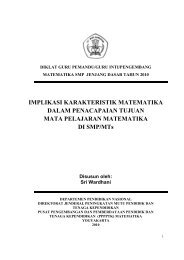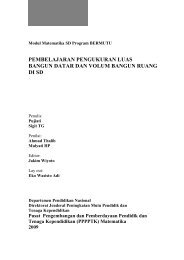25 Biggest Mistakes Teachers Make and How to Avoid Them
25 Biggest Mistakes Teachers Make and How to Avoid Them
25 Biggest Mistakes Teachers Make and How to Avoid Them
Create successful ePaper yourself
Turn your PDF publications into a flip-book with our unique Google optimized e-Paper software.
Teacher Confessions of Worst Treatment of a Child<br />
9.6. Do you ever think about this incident? If yes, approximately how<br />
often since the occurrence(s)?<br />
One–five times for 5 years.<br />
9.7. If faced with the same or a similar situation, what would you do?<br />
The same thing.<br />
Commentary<br />
This teacher suffers from the omnipotent-teacher syndrome. He acts allpowerful<br />
<strong>and</strong> all-knowing. He’s in charge <strong>and</strong> a mind reader, knowing what<br />
the player was thinking. He is authoritarian, expecting immediate obedience<br />
<strong>to</strong> his request; when he did not get it, he passed judgment <strong>and</strong> administered<br />
punishment in a split second giving the child no opportunity <strong>to</strong> explain. The<br />
child could have been hesitating for another reason. Although the coach felt<br />
that he was correct <strong>and</strong> the child was wrong, I question his unwillingness <strong>to</strong><br />
examine his behavior <strong>and</strong> seek alternatives, particularly when he admitted<br />
he overreacted <strong>and</strong> he used physical force <strong>to</strong> make the student sit down. To<br />
avoid the omnipotence syndrome, teachers can adopt a more authoritative or<br />
diplomatic way of dealing with students that does not dem<strong>and</strong> unquestioned<br />
obedience. Whenever possible, teachers should give students an opportunity<br />
<strong>to</strong> explain their behavior.<br />
Mistake 4: Public Ridicule<br />
Teacher # 10<br />
A Scenario of a Teacher’s Worst Treatment of a Student<br />
I <strong>to</strong>ld the students in my class <strong>to</strong> get in groups for a project. There was one student<br />
who nobody wanted <strong>to</strong> work with because she was “weird.” I made another student<br />
get out of his group <strong>and</strong> work with her. I yelled at him <strong>and</strong> ridiculed him in front of<br />
the class. He was so angry at me <strong>and</strong> embarrassed that he turned bright red <strong>and</strong><br />
wouldn’t look at me for the rest of the class period. Previously, he would come <strong>to</strong> my<br />
classroom after school <strong>and</strong> help me in class. After this incident he never did it again.<br />
Motive Probe<br />
10.1. Describe the problem <strong>and</strong> your specific role in it.<br />
I didn’t consider his feelings. I <strong>to</strong>ok out my anger on him.<br />
10.2. Why did you do what you did?<br />
I felt badly for the little girl <strong>and</strong> I also wanted everything <strong>to</strong> be my way.<br />
201





